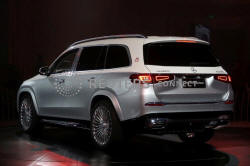Soaring SUV sales keep carmakers on collision course
with climate policy
 Send a link to a friend
Send a link to a friend
 [January 10, 2020] By
Edward Taylor [January 10, 2020] By
Edward Taylor
FRANKFURT (Reuters) - Soaring demand for
SUVs drove record sales for premium carmakers including BMW and Mercedes
last year, leaving the industry on collision course with government
efforts to tackle global warming despite big investments in electric
vehicles.
BMW <BMWG.DE> said on Friday deliveries by its main luxury brand rose 2%
to a record 2,168,516 vehicles last year, thanks to a 21% jump in sales
of its "X" branded sport-utility vehicles (SUV) which now make up 44% of
the BMW brand's global sales.
At Mercedes-Benz, the world's best selling premium car brand, every
third luxury car sold last year was an SUV.
Automakers across the world are investing billions in electric vehicles
to try to meet tougher emissions regulations. But the jury is out on how
many drivers will buy them.
"Consumer preferences for SUVs could offset the benefits from electric
cars," the International Energy Agency (IEA) warned in its November
World Energy Outlook 2019 report.

The IEA said a doubling in market share had seen emissions from SUVs
grow by nearly 0.55 gigatons of carbon dioxide (CO2) during the last
decade to roughly 0.7 gigatons.
As a result, SUVs were the second-largest contributor to the increase in
global CO2 emissions since 2010 after the power sector - ahead of heavy
industry including iron and steel, cement, aluminum, as well as trucks
and aviation, it said.
There are now more than 200 million SUVs around the world, up from about
35 million in 2010, accounting for 60% of the increase in the global car
fleet since 2010, IEA data shows.
"If the popularity of SUVs continues to rise in line with recent trends,
this could add another 2 million barrels per day to our projection for
2040 oil demand," it said.
BMW and Mercedes-Benz say their vehicles are among the most fuel
efficient available, thanks to hybrid and other technologies which are
already available on the market.
[to top of second column] |

A Mercedes-Maybach GLS sports utility vehicle (SUV) is seen at a
launch event ahead of Guangzhou auto show in Guangzhou, Guangdong
province, China November 21, 2019. REUTERS/Yilei Sun/File Photo

Both carmakers, which say they aim to achieve new sales records this year, are
preparing to launch fully electric SUVs - the BMW iX3 and Mercedes-Benz EQC -
which they say shows a commitment to a cleaner future.
The newly registered SUVs of German group brands had reduced their CO2 emissions
by 35% since 2008, it added.
BMW plans to launch 25 hybrid and electric cars by 2023, with more than 12
models being fully electric versions.
By 2025, half of all its cars are expected to be hybrid or electric vehicles, it
said.
Daimler-owned <DAIGn.DE> Mercedes expects half of its sales to be hybrid or
electric by 2030, with Europe reaching the 50% mark in 2025.
Peter Fuss, a partner at EY, said German carmakers pushed sales of higher-margin
SUVs last year ahead of the introduction of more stringent European clean air
rules in 2020.
In the fourth quarter of 2019 there was an unusually large rise in commercial
registrations in Germany, Italy and Britain compared with figures for private
consumers, in a sign carmakers were pushing certain models into the market.
"From January 2020 onwards, new car fleets need to adhere to limits so as not to
face large fines," Fuss said. "We will not see the same growth rates in this
segment as we did last year."
Electric car registrations are expected to take off in mid 2020, Fuss said.
But that will depend on drivers being prepared to buy them, and perhaps also on
how cheaply manufacturers are prepared to sell them.
(Reporting by Edward Taylor; Editing by Mark Potter)
[© 2020 Thomson Reuters. All rights
reserved.] Copyright 2020 Reuters. All rights reserved. This material may not be published,
broadcast, rewritten or redistributed.
Thompson Reuters is solely responsible for this content. |